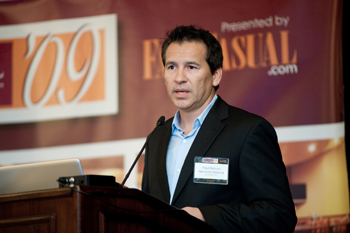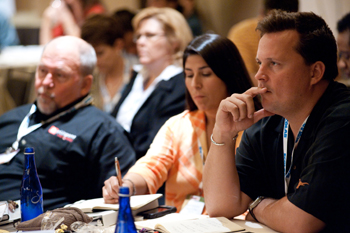Article
Fast Casual Executive Summit: Tough times bring operators together
The most successful brands are opening up to one another as the industry awaits signs of recovery.

September 22, 2009 by Valerie Killifer — senior editor, NetWorld Alliance
*Click hereto view a slideshow from day one of the event.* Click here to view images from the dinner event at Trader Vic's. * And click here to view images from day two.
One thing you usually can count on as a business journalist is that companies want to tell you as little as possible about their strategies, for fear of giving away something helpful to a competing brand.
But what I learned at this year's Fast Casual Executive Summit is that sometimes maintaining a professional coyishness doesn't help you succeed. Sometimes, such as amid a balance sheet-breaking recession, it takes an open forum, candid discussions and one of the most-mentioned words of the two-day event — transparency — not only to build relationships, but to succeed in times of struggle.
For two days in Dallas, 130 fast casual industry executives discussed the obstacles each of them face and the best solutions for overcoming those hurdles.
 |
Paul Barron welcomed attendees to the 2009 Fast Casual Executive Summit, Sept. 14-15 in Dallas at the Hotel Palomar. |
Many of the executives in attendance want to do the right thing in the right way. With fast casual operators, that includes everything from stepping up sustainability commitments to motivating their teams through positive reinforcement — all for the benefit of their brand, their employees and their guests.
After all, we are living in a time of "recession haircuts," said Au Bon Pain CEO Sue Morelli – and we all are facing the same economic climate.
Sustainability and social responsibility
One of the most informative sessions at this year's Summit revolved around the topics of sustainability and social responsibility.
Peter Truitt, CEO of Truitt Bros.; Jeff Harvey, president and CEO of Burgerville; and Kate Geagan, a dietician and author of "Go Green Get Lean: Trim Your Waistline with the Ultimate Low-Carbon Footprint Diet," each spoke about the roles sustainability and social responsibility play in their operations and lives.
Sustainability is a complicated issue all in itself, and during the session, Truitt tried to break down the barriers between understanding what it is and using that knowledge to put the ideal into practice.
Truitt said many people think sustainability is synonymous with green, but it isn't.
"Our focus is on the food; that's what we do. So for us, it has a lot more to do with responsibility and transparency," he said. "In the restaurant industry, sustainability has somehow become disconnected from food and the menu. Sustainability as a term won't work on a menu because most consumers don't know what it is. However, narratives about the goodness of the food, the story of the food and honesty about the source of the food on the menu is extremely powerful to the consumer. The consumer adds it up to quality."
 |
Summit attendees listened to speakers Peter Truitt, Jeff Harvey and Kate Geagan during the session, Sustainability Takes a New Track to the Profit Line. |
Although it has only 40 units, Vancouver, Wash.-based Burgerville is making a big difference in regard to sustainability – forming partnerships with suppliers, including Truitt Bros., designed to help keep everyone throughout the supply chain in business.
Their approach to sustainability has become part of their brand story. Burgerville doesn't need a platform of 150 or more locations to make a difference – they are doing so by following their core values.
What I learned is that many brands want to be part of the "sustainability" movement, but don't know where to begin. While there's no easy way to eat an elephant, progress can be made one bite at time – even if that bite starts out small.
From the CEOs
The final Summit presentation was a CEO roundtable featuring Rubio's CEO Dan Pittard; Joe Tortorice, CEO of Jason's Deli; Paul Mangiamele, CEO of Salsarita's; and Don Fox, COO of Firehouse Subs.
During his presentation, Tortorice his concept revolves around the idea of servant leadership. The practice, he told Summit attendees, helps remove obstacles people face to accomplishing their goals.
The standards of servant leadership as applied at Jason's Deli include:
- Develop yourself
- Continuously encourage
- Always remain humble
- Practice spirituality
- Be generous
- Emotionally connect
Tortorice said he developed the benchmarks about 10 years ago after studying servant leadership, and that its implementation has had a tremendous impact on his company culture.
"It's always a work in progress. It's not something you turn on a dime," he said. "You have to live it by example. We're still on the journey, but we're way more down the road on the journey than where we were, say, 15 years ago."
What I learned is that some of the best-run brands have a strong core set of values and beliefs that continue to guide each company even in uncertain times. And the strongest brands, like the strongest people, can use those core values to fall back on when times get tough.
*Click herefor more stories from the Fast Casual Executive Summit on
* To read about the Summit and view more photos, visitLinda Duke's blog.
* You can also findrelated storiesatwww.foodchannel.com.
 ChatGPT
ChatGPT Grok
Grok Perplexity
Perplexity Claude
Claude











